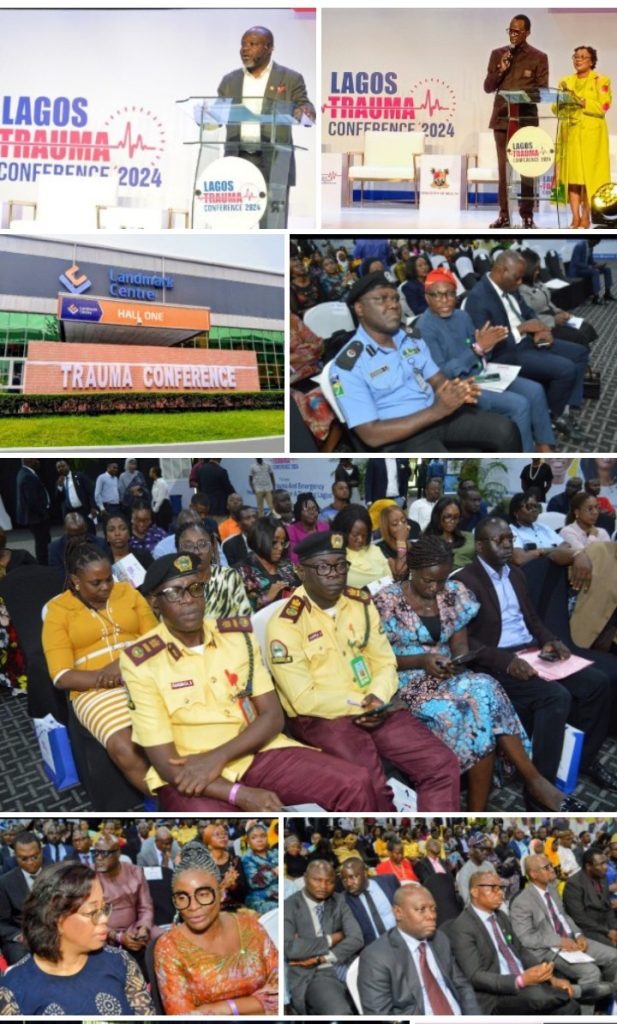By Aminat Umar
• As the Innovative Trauma Conference Sparks Momentum for Healthcare Transformation
• Governor Sanwo-Olu and Minister of State for Health Sign Landmark MOU for Epe General Hospital

Lagos State reached a pivotal moment in healthcare today as government leaders gathered at the Landmark Event Centre in Victoria Island for the first-ever Lagos Trauma Conference. With the theme “Advanced Trauma and Emergency Healthcare Systems for a Thriving Lagos,” the conference highlighted critical reforms to enhance trauma care and emergency response across the state. The event underscored Lagos’ commitment to transforming its healthcare landscape, ensuring faster, more efficient emergency services, and improving patient outcomes in critical situations.
According to a press statement signed by the Director Public Affairs, Tunbosun Ogunbanwo, it states that Governor Babajide Sanwo-Olu, alongside the Minister of State for Health and Social Welfare, Dr. Tunji Alausa, and Lagos State’s First Lady, Dr. Ibijoke Sanwo-Olu, recently headlined a pivotal discussion on advancing trauma care in Lagos. As keynote speakers, they outlined the state’s comprehensive strategy to strengthen trauma response systems, improve healthcare infrastructure, and enhance emergency medical services. Their efforts underscore a strong commitment to saving lives and boosting healthcare outcomes in the face of rising trauma cases in the metropolis. The event marked a significant step towards a safer, healthier future for Lagosians.
At a landmark event, the Lagos State Government and the Federal Ministry of Health signed a pivotal Memorandum of Understanding (MOU) that marks the official handover of the General Hospital in Epe to the Federal Government. This agreement paves the way for the hospital’s transformation into the Federal Medical Centre, Epe (FMC Epe), a move set to enhance healthcare services in the region and strengthen federal-state collaboration in public health.

In a bold and transformative step, the government has reaffirmed its dedication to strengthening healthcare infrastructure throughout the state. This initiative marks a significant investment in improving medical facilities, ensuring better access to quality care, and addressing the needs of communities statewide. Through this comprehensive approach, the state aims to build a more resilient and efficient healthcare system, laying the foundation for long-term public health advancements.
In his keynote address, Governor Sanwo-Olu praised the unwavering commitment of healthcare professionals and private sector partners for their pivotal role in shaping the future of healthcare in Lagos. He emphasized their collective efforts as essential to advancing the state’s healthcare system, recognizing their contributions as a cornerstone in building a healthier and more resilient Lagos.
“The robust conversations we’ve had on enhancing trauma care and emergency healthcare systems have reaffirmed our vision of a thriving Lagos,” he stated.
The governor stressed the importance of building a robust healthcare system that can effectively manage both routine emergencies and large-scale crises. He highlighted the need for a system that is not only prepared for everyday medical demands but also resilient enough to respond swiftly in times of major incidents, ensuring the safety and well-being of all citizens.

The conference provided a crucial forum for exploring strategic investments in healthcare infrastructure. Governor Sanwo-Olu outlined ambitious plans to upgrade and expand trauma centers across the state, signaling a major push towards improving emergency care. He highlighted the administration’s progress, noting substantial achievements in renovating existing healthcare facilities and establishing new ones, all part of a broader effort to modernize the state’s healthcare system and enhance its capacity to meet growing demands.
Underscoring the government’s focus on trauma care, the governor emphasized that trauma is one of the leading causes of death in Lagos. He reinforced the urgency of addressing this critical issue by enhancing trauma care services, positioning it as a central pillar of the state’s healthcare strategy to save more lives and reduce preventable deaths.
“While we have made progress in healthcare delivery, there remains ample room for improvement, particularly in trauma care,” he added.
The governor expanded on the state’s infrastructure advancements, highlighting the construction of a cutting-edge general hospital in Ketu as a key project. Alongside other healthcare facilities in development, these initiatives are designed to significantly strengthen the state’s emergency response capabilities, ensuring that Lagos is better equipped to handle urgent medical situations and enhance overall healthcare delivery.
Governor Sanwo-Olu highlighted the pressing need for workforce development in the healthcare sector, announcing targeted training programs to enhance emergency response. He emphasized that Advanced Trauma Life Support (ATLS) training for healthcare professionals, coupled with the launch of a paramedic and emergency medical technician program, will greatly boost the state’s capacity to respond swiftly and effectively to emergencies, elevating the quality of care delivered in the field.
Governor Sanwo-Olu reaffirmed the importance of making trauma care financially accessible, unveiling plans to extend the Lagos State Health Insurance Scheme to include emergency services. He also announced the creation of an Emergency Care Fund aimed at supporting the most vulnerable residents, ensuring that no one is deprived of life-saving trauma care due to financial constraints. This initiative reflects the administration’s commitment to equitable healthcare, making critical care accessible to all, regardless of income.
“As we strive for universal healthcare access, we must ensure that no life is lost due to an inability to pay for treatment,” he said.
Earlier, Dr. Tunji Alausa, Minister of State for Health and Social Welfare, expressed his appreciation for being part of the transformative healthcare reforms in Lagos. He highlighted the transfer of Epe General Hospital to the Federal Government as a significant milestone, marking a new chapter in healthcare delivery for the region. Dr. Alausa emphasized that this transition would lead to enhanced services and improved medical care for the local community, further strengthening the state’s healthcare landscape.
“This project is a testament to the vision and leadership of our dear President, His Excellency, Bola Ahmed Tinubu,”
He remarked that the Federal Medical Centre (FMC) Epe is poised to meet the needs of the rapidly growing population in Epe and its surrounding areas. This facility will play a crucial role in providing essential healthcare services, ensuring that the expanding community receives the quality medical attention it deserves.
Dr. Alausa outlined the array of specialized services that the new Federal Medical Centre (FMC) Epe will offer. These include pediatric and neonatal intensive care, advanced surgical procedures like open-heart surgeries, a cutting-edge trauma center, and comprehensive kidney transplant services. This impressive spectrum of care is designed to address diverse healthcare needs, positioning FMC Epe as a leading medical facility in the region.
He also announced the launch of a School of Nursing and a Federal College of Complementary and Alternative Medicine (FEDCAM) in Epe. These institutions will provide comprehensive training programs in acupuncture, naturopathy, and other complementary therapies, aiming to diversify healthcare education and enhance the skill sets of future healthcare practitioners in the region.
Dr. Tunji Alausa expressed gratitude to traditional leaders and lawmakers for their crucial support in bringing the project to fruition. He specifically acknowledged the Oloja of Epe, Oba Kamorudeen Ishola Animashaun, and Hon. Wale Raji, the Member representing Epe Federal Constituency at the House of Representatives. Their collaborative efforts and unwavering commitment were instrumental in making this significant development a reality for the community.
The First Lady of Lagos State, Dr. (Mrs.) Ibijoke Sanwo-Olu, passionately addressed the critical significance of trauma care, sharing insights from her experience as a medical doctor. Her personal journey in the medical field underscored the vital role that effective trauma services play in saving lives and improving outcomes for patients, reinforcing her commitment to enhancing healthcare in the state.
“The need for a strong trauma care system is undeniable,” she stated. “Emergencies can affect anyone at any time, whether through road accidents, domestic violence, or natural disasters.”
She underscored the necessity of preparedness, reflecting on her proactive measures during political campaigns and public events to ensure that hospitals were equipped to manage potential emergencies. Her commitment to readiness highlights the importance of a well-prepared healthcare system capable of responding swiftly to crises and safeguarding the well-being of the community.
She advocated for a revival of grassroots health education, proposing that schools reinstate programs such as the Red Cross, Girls’ Guide, and Boy Scouts. She emphasized the value of equipping students with essential skills in basic life support, fostering a culture of health awareness and preparedness from a young age. This initiative aims to empower the next generation with the knowledge and confidence to respond effectively in emergencies.
“Catching them young will ensure a future generation of first responders who are well-equipped to handle emergency situations,” she noted.
Dr. Ogunyemi on the other hand stressed the critical need for mental health support for healthcare professionals managing trauma cases. She highlighted current initiatives aimed at delivering psychosocial assistance, ensuring that frontline workers are equipped to maintain their resilience amidst the challenges they face. By prioritizing their mental well-being, these efforts aim to sustain the effectiveness and morale of those dedicated to caring for others in times of crisis.
She pointed out that as Lagos continues to grow, the urgency for high-quality emergency services becomes increasingly critical. The expanding population and urbanization intensify the need for effective emergency response systems, highlighting the importance of investing in robust healthcare infrastructure to meet these rising demands.
“Trauma care and emergency healthcare services are central to this, as they are often the first line of defense in saving lives and reducing preventable deaths,” she said.
In a compelling presentation titled “Pre-Hospital Emergency Care in Lagos: The Past, Present, and Future,” Dr. Olusegun Ogboye, the Permanent Secretary of the Lagos State Ministry of Health, underscored the necessity of a coordinated response to trauma incidents. He highlighted the importance of integrating resources and efforts among various stakeholders to ensure timely and effective care for victims, paving the way for a more efficient emergency response system in the state.
He maintained, “We must ensure that our emergency response systems are integrated and that all healthcare providers are trained in trauma management. This includes developing a unified communication strategy that allows for seamless coordination during emergencies.”
Dr. Ogboye further emphasized the critical role of data collection in enhancing trauma care. He explained that systematic data gathering can provide valuable insights into injury patterns, response times, and treatment outcomes, enabling healthcare providers to refine their strategies and improve the overall quality of care. This approach not only aids in effective resource allocation but also supports evidence-based practices that can significantly reduce trauma-related fatalities and enhance patient outcomes.
“Understanding the patterns and causes of trauma in our communities will help us implement targeted prevention strategies,” he postulated.
He advocated for the creation of a centralized trauma registry to enhance understanding of patient outcomes and service delivery. This registry would serve as a vital resource, offering comprehensive data on trauma incidents, treatment effectiveness, and recovery patterns. By consolidating this information, healthcare providers can identify trends, improve care protocols, and ultimately enhance the effectiveness of trauma services across the state.
In conclusion however, The event attracted a diverse group of stakeholders, bringing together prominent healthcare professionals from both the public and private sectors, alongside representatives from the Nigeria Police, Lagos State Ambulance Service, and Lagos State Emergency Service. Private healthcare providers also participated, underscoring a collaborative commitment to advancing trauma care and emergency response initiatives in the state









